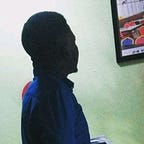The Tides of Iseyin (6) — My Father Once Told Me.
Many things are subjects of many debates; that mothers are revered, held in awe than fathers should be a universal truth. Do not put into consideration the number of mothers' days we have. Consider things said about mothers and how they are venerated. Mothers are gold because they are precious but fathers are mirrors maybe because you see a reflection of you in them and them in you. Fathers are celebrated too but as much as mothers? I doubt.
Fathers are complicated. I do not think fathers are loved as much as mothers. Whether that is fair or not is another topic for another debate entirely. I think fathers are either feared, admired, or accepted. Many fathers are the voices of authority in their homes. Therefore, they are either feared as dictators or admired for how they carry out their duties. They are accepted in many cases because they are neither good nor bad but there’s an acceptance that they are fathers. What then is fatherhood? The ability to fertilize numerous eggs, the ability to provide, being “responsible” or being the head of a family? Being a father is multifaceted which makes it complicated to know what fatherhood is, objectively. In the nebulousness of fatherhood, many adjectives like good, bad, weak, strong, responsible, irresponsible, and so on are prefixed to being a father.
My father is complicated like any other father or any other human. I do not fear my father. Not one bit. But I admire my father when there is a need to and I accept him in his complicatedness. The perfect father? No. But isn’t being perfect a subjective submission. After all, what “is” appears in many ways to different people. If he wasn’t my father, he would have been admired the same way for what he’s been able to achieve for himself. That I know! But like every human, he is without faults.
Where I took steel hands on the cheeks from my mother with warm words to heal physical wounds later, I sat at the feet of my father to learn the sagacious lessons of life. My father once told me that Chinua Achebe was once asked by James Baldwin what his (Achebe) favorite work is and Achebe replied that “it is like asking a father who his favorite child is. No responsible father will give you an answer. However, you will always find me reading Arrow of God”. Just like I don’t think my father has a favorite child, I do not have a favorite parent. However, you will find me sympathizing with my mother. By the way, sympathy is my greatest attribute.
I borrow lessons from the seasons of my father. My father once told me that “success has many relatives but failure is an orphan”. He told me this at one of the lowest points of my life when I was down and everyone left. Every time I encounter people leaving because I am a nobody (at the moment), I find consolation and wisdom in the words of my father. No one wants to associate with a failure but at your slightest success, they become your biggest fans and your loudest trumpeters. When father held many positions, our house used to be a sea of legs but after he left the positions, the legs left and we became our own companions. People associate with others they think they can benefit from in whatever sense. His aphorism is a constant reminder of how you are mostly recognized by acquaintances when you’re beneficial to them whether in a material sense or just by mere association. That is life!
Father once told me that “relatives by any form will stand by you than an acquaintance who is so dear to you”. Everywhere I find myself, I’ve always tried to look out for someone who I feel connected to either by blood, community or rationality, or experience. In many cases, they are always people from Iseyin when I’m far from home, an OAU student in a new school, a Yoruba man in a foreign land, etc.
My father once told me that “you see those ‘mechanics’, they are closer to the family than many who we think are our family friends. They want the best for us, and they are real”. Whether that is true is debatable because human science is an inexact science. However, my father’s words are careful pointers to the fact that the people we think are the lows of the societies can be the most trusted allies. Therefore, they should be treated with regard and not disdain. When I began to watch Downton Abbey, I understood him perfectly.
Whether of what my father once told me or not, of what he has said and what he has acted, there are indelible lessons from his words. Human characters are inherently flawed because of the original sin according to St Augustine, but in those flaws lie lessons to learn. At the feet of my father, I’ve gained wisdom from his anger, love, intelligence, the admittance of imperfection, and his sense of communitarianism.
